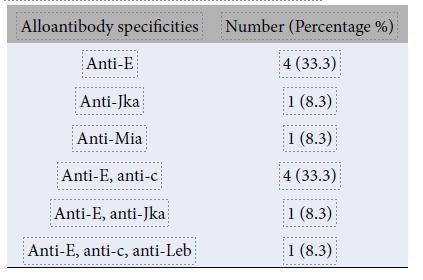Unlocking Insights into Alloantibodies in Thalassemia: Findings from a Single-Center Study
DOI:
https://doi.org/10.15419/bmrat.v11i1.856Keywords:
Alloantibody, blood transfusion, thalassaemia, antibody specificityAbstract
Background: Thalassemia is a common inherited hemoglobin disorder in Malaysia. Regular transfusions of packed red cells are required to treat transfusion-dependent thalassemia. These transfusions, although lifesaving, may lead to complications such as red blood cell (RBC) alloantibody formation. This study aimed to determine the incidence of RBC alloantibodies in thalassemia patients who regularly received blood transfusions at our center.
Methods: This study included 33 thalassemia patients who received regular transfusions at Dungun Hospital, Terengganu, Malaysia, from 2017 to 2023. Laboratory data and clinical presentation information were obtained. Antibody screening was conducted to identify potential alloantibodies that could react with donor blood. All samples that tested positive for alloantibodies were investigated further to determine antibody specificity.
Results: The rate of RBC alloimmunization in the studied thalassemia patients was 36.4%. Six alloantibodies were detected in the patient cohort, with some individuals developing antibodies of single or multiple specificities. The most frequently present alloantibodies were against the Rh blood group system.
Conclusion: The development of alloantibodies related to blood transfusions can create challenges in managing transfusion-dependent thalassemia patients. It is advisable to incorporate extended-matched phenotyping into care protocols to mitigate the risk of alloimmunization and minimize the chances of these patients developing blood transfusion-related alloantibodies.

Published
Issue
Section
License
Copyright The Author(s) 2017. This article is published with open access by BioMedPress. This article is distributed under the terms of the Creative Commons Attribution License (CC-BY 4.0) which permits any use, distribution, and reproduction in any medium, provided the original author(s) and the source are credited.
